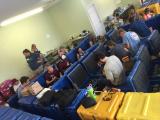Dear EarthScope Community and EPIC PIs:
In September of 2023 we discovered that SmartSolo node (IGU-16HR 3C, 5Hz) data archived from EPIC experiments has a non-standard polarity on the Z-channel relative to the down-positive industry geophone convention. Details of this discovery and the steps that will be taken to correct this discrepancy, which will affect the existing and future archives, are outlined below.
Issue
The expected polarity for data archived from EPIC experiments are as follow:
Broadband seismometer – Up (Z-dip = -90), North and East motion produce a positive polarity.
Geophone – Down (Z-dip = +90), North and East motion produce a positive polarity
Data archived, both PH5 and SEED, prior to October 05, 2023 from EPIC experiments using the SmartSolo nodes have the following polarity and metadata mismatch:



